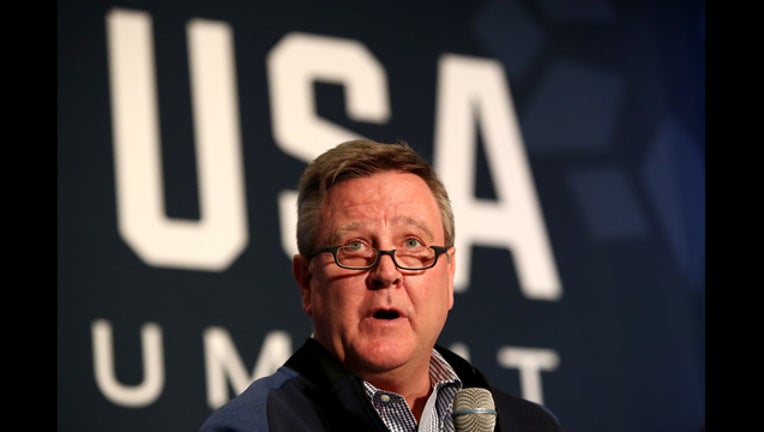Citing health problems, CEO to leave U.S. Olympic Committee

PARK CITY, UT - SEPTEMBER 25: USOC CEO Scott Blackmun addresses the media during the Team USA Media Summit ahead of the PyeongChang 2018 Olympic Winter Games on September 25, 2017 in Park City, Utah. (Photo by Maxx Wolfson/Getty Images)
COLORADO SPRINGS, Colo. (AP) - Scott Blackmun resigned as chief executive of the U.S. Olympic Committee on Wednesday, citing difficulties with prostate cancer and the federation's need to urgently move forward to address the sex abuse scandal that has rocked gymnastics.
The 60-year-old CEO was diagnosed with prostate cancer earlier this winter and did not attend the Pyeongchang Games.
Blackmun leaves amid calls for his departure, including from two U.S. senators who said neither he nor the USOC at large reacted properly to sex abuse cases involving Larry Nassar, the doctor who abused members of the U.S. gymnastics team.
The USOC is conducting an independent review of when Blackmun and others learned the details about abuse cases at USA Gymnastics and whether they responded appropriately.
Susanne Lyons, a member of the board, will serve as acting CEO.
At a news conference to kick off the Olympics, USOC chairman Larry Probst said Blackmun had served the USOC with distinction and the board found no reason to relieve him.
"Given Scott's current health situation, we have mutually agreed it is in the best interest of both Scott and the USOC that we identify new leadership so that we can immediately address the urgent initiatives ahead of us," Probst said Wednesday.
The USOC said it was starting several initiatives, including providing new funding and resources for Nassar victims. It also will review its relationships with national governing bodies of Olympic sports and double funding to the U.S. Center for SafeSport.
Blackmun's last several years at the helm of the USOC have been focused on establishing the center, which stemmed out of task forces to determine how to compel governing bodies of all Olympic sports to use the same rules for reporting and handling abuse cases.
It was a herculean task that involved raising millions of dollars to start an independent organization that polices abuse cases in a similar manner as the independent U.S. Anti-Doping Agency runs doping control in the United States.
But all the cases in question -- including dozens involving USA Swimming and USA Gymnastics -- occurred before the new protocols came into play. The shocking testimony from dozens of gymnasts who were abused by Nassar led to calls for a complete turnover of the USA Gymnastics board, and then for Blackmun's removal.
U.S. Sen. Jeanne Shaheen, D-N.H., said it's clear the USOC's culture needs to change.
"The U.S. Olympic Committee must now bring on new leadership determined to deliver answers and accountability regarding how Larry Nassar was able to freely abuse young girls for decades, as well as answers to questions about abuse in other Olympic programs," Shaheen said.
Blackmun started as CEO just before the 2010 Vancouver Games and settled an organization that had been rife with infighting after the surprise removal of Jim Scherr and his replacement with Stephanie Streeter, who lasted less than two years.
Blackmun smoothed over rocky relationships with national governing bodies and with the International Olympic Committee, renegotiating an agreement over sharing revenues from TV and sponsorship deals that caused problems between the two entities for years.
The reworked deal smoothed the way for the USOC to bring the Olympics back to the United States for the first time since 2002, when it landed the 2028 Games for Los Angeles. Some, however, criticized that deal as a consolation prize; LA really bid for the 2024 Games, which were awarded to Paris, and the IOC ended up granting 2028 to Los Angeles at the same time as the only other candidate for 2024.

